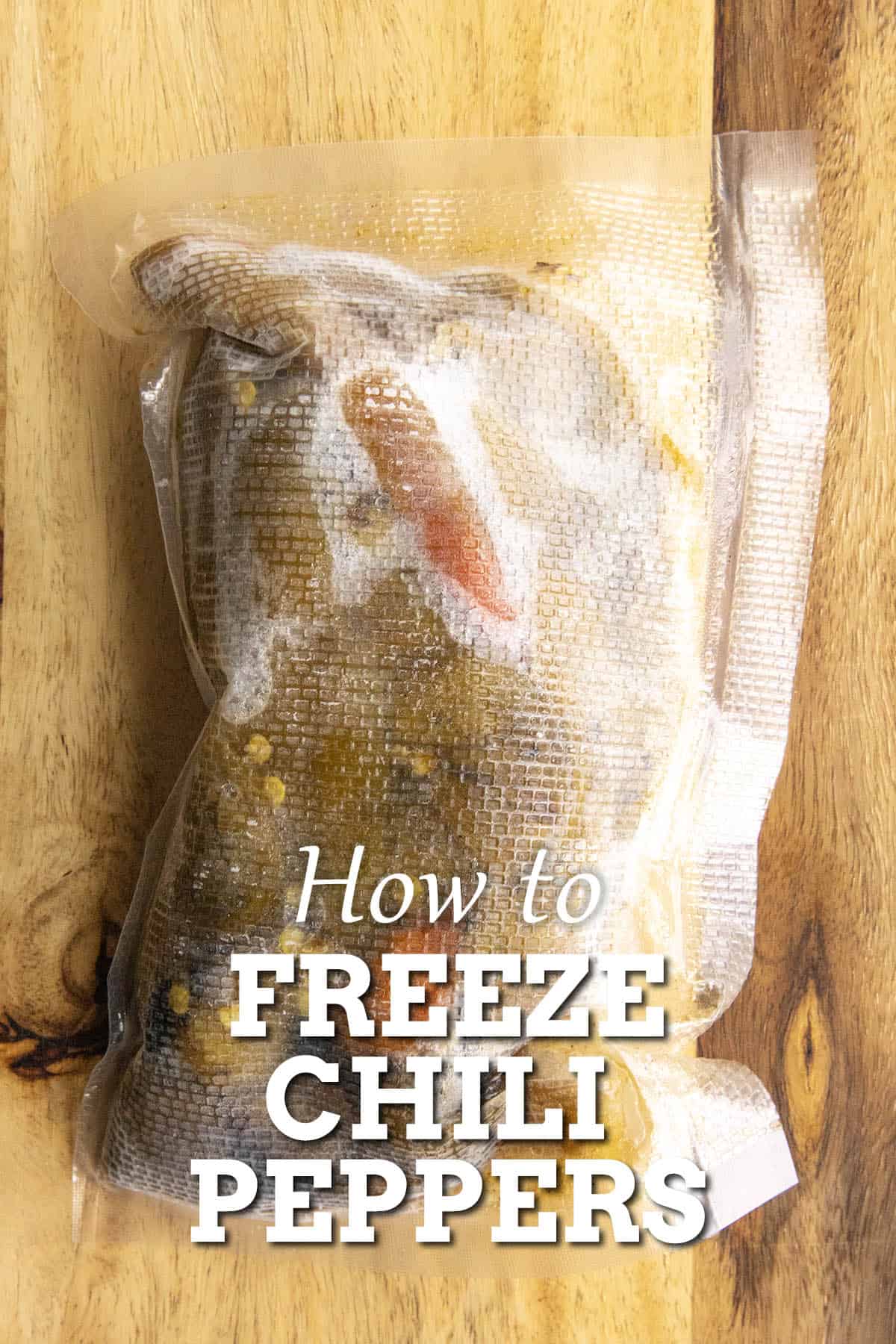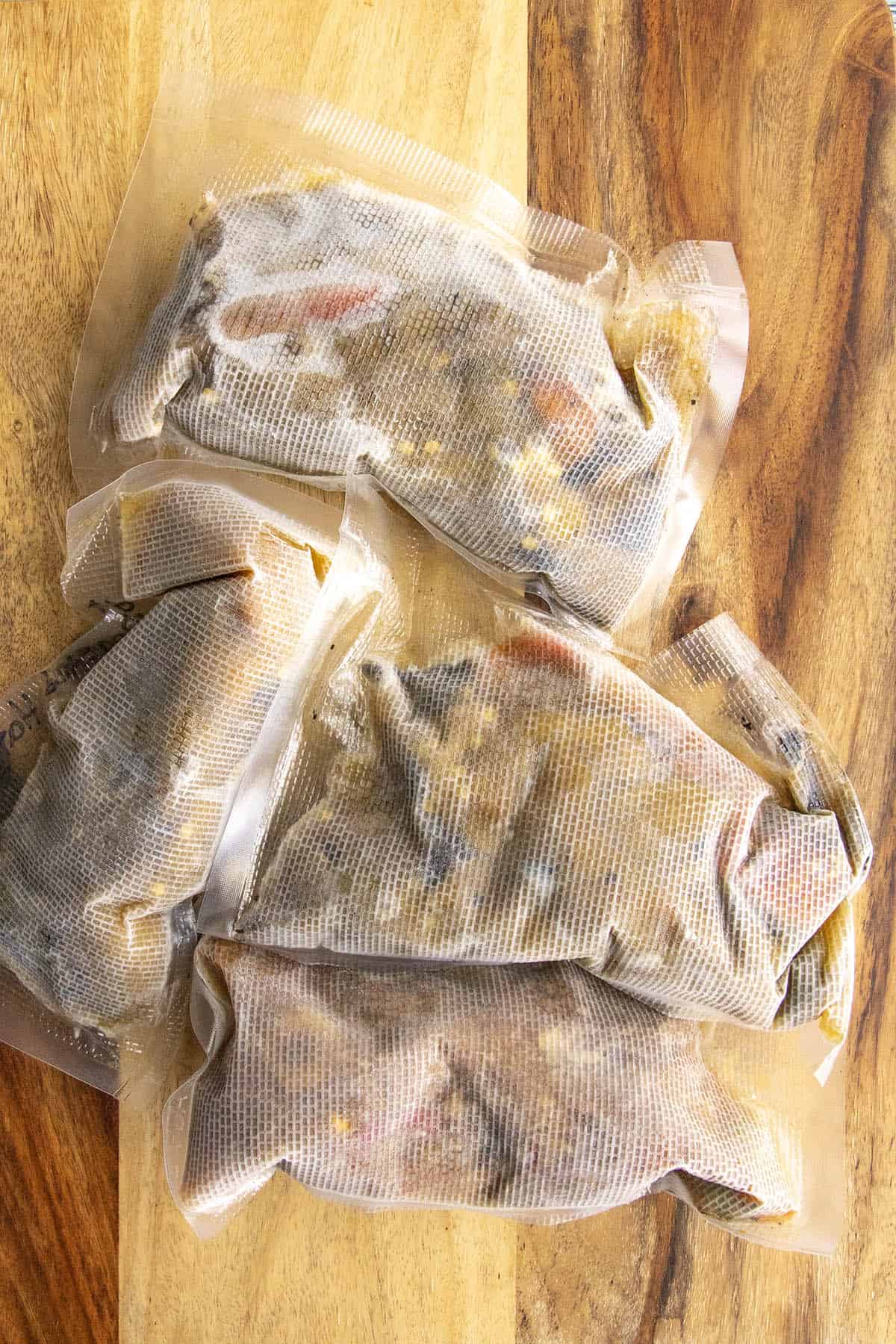Freezing peppers is a great way to preserve your chili pepper harvest. Learn how to freeze peppers of any kind so you can enjoy them all year long.

How to Freeze Peppers
Freezing peppers is a good idea if you have a large crop and want to save them for later use. You don't have to cook your chili peppers before freezing, although you can skin or peel them if desired.
Just keep in mind that after you thaw them, the skins usually come right off easily.
You can freeze any type of chili pepper this way, including freezing bell peppers, freezing jalapeno peppers, even the hottest of the superhot chili peppers.
How to Freeze Peppers - Step by Step
- First, select fresh peppers that show no signs of rot.
- Wash the peppers clean, then dry them completely.
- Slice the peppers open and remove the stems. Remove the seeds and membrane, if desired.
- Chop the peppers if you'd like, or you can freeze them whole.
- Transfer the peppers to freezer bags and remove as much air as possible.
- Set the peppers into the freezer. Use as needed.
Some people like to blanch their peppers before freezing, but it is not necessary. If you'd like to blanch your peppers, however, simply set your sliced peppers into boiling water for 2 minutes. Drain, cool and dry them, then freeze as needed.
Tips for Freezing Peppers
You can remove the seeds and membrane from the peppers if you'd like by scraping them out with a spoon, or keep them in if you'd like. Most of the heat from most peppers is held within the whitish interior, so choose accordingly.
You can also set out your chopped or whole fresh peppers onto a baking sheet and set it into the freezer before bagging. Then, once they are frozen, transfer them to freezer-safe bags and seal them up.
Safety Tip
It is recommended to wear gloves when handling hot chili peppers. Capsaicin, the chemical that makes chili peppers hot, is an oil that can get onto your skin and cause a burning sensation. Gloves will protect you from the burn.
If you do feel the burning sensation, wash your hands thoroughly. There are many methods to help. Learn more about how to stop the chili pepper burn.
How Long Do Frozen Peppers Last?
One you freeze chili peppers, it is recommended they be consumed within 6 months to maintain best quality.
After about 6 months, they start to lose quality and may suffer from freezer burn.

How to Thaw Frozen Peppers
To thaw frozen peppers, simply remove the amount you need from the freezer and let them come to room temperature.
It is good to freeze them in portions that you normally use, but if you freeze them in a very large bag, they should break apart fairly easily so you can keep the unneeded portion frozen.
Using Frozen Peppers - How to Cook with Frozen Peppers
Cooking with frozen peppers is easy. Simply thaw a portion of them required for your recipe and use them as you would fresh peppers.
They will most likely be softer, however, than fresh peppers, so consider this for the recipe you are making.
Cook them into anything from soups and stews, stir fries and more.
Frozen peppers can be used to make sauces and hot sauces, and they can also be dehydrated without issue to make powders and seasoning blends.
See my post on How to Cook with Frozen Peppers for further information.
Can You Refreeze Thawed Peppers or Vegetables That Have Been Previously Frozen?
According to FoodSafety.gov, you can safely refreeze thawed or partially thawed food if it still contains ice crystals or at 40 °F or below. Partially thawing and refreezing them, however, may negatively affect the food quality. But, they will be safe to eat.
Enjoy!
Further Pepper Preservation and Information
See below for other information to help you with your chili pepper harvest. There are answers to some of the most common questions I receive on the site.
- How to Freeze Roasted Peppers
- How to Freeze Stuffed Peppers
- Dehydrating Chili Peppers
- How to Pickle Chili Peppers - a Guide
- How to Ripen Unripe Peppers
- How to Ferment Peppers
- Saving Pepper Seeds for Growing Later
- How to Can Peppers
- How to Store Peppers
NOTE: This post was updated on 10/8/25 to include new photos. It was originally published on 4/14/14.



Richard Hall says
Brilliant advice, Thank you.
Mike Hultquist says
Thanks, Richard.
Reuben Valles says
I have been wondering what to do with the chilies my wife has been growing quicker than I can eat them. I will be freezing from here on. Thank you so much
Reuben
Mike Hultquist says
Glad to help, Reuben!
Mike says
I freeze them or chopped. The chopped ones go into ice cube trays. When frozen I pop them out and store them back in the freezer. When I want to use them I just toss in the numbers of cubes I believe the recipe needs.
Mike Hultquist says
Perfect! Thanks for sharing, Mike.
Donna Bishop says
Thanks for the information! I grow a variety of peppers each year, and freezing some is how I get through the off season. Already having success with my Mucho Nacho and Jalapeño peppers so far. Got Fresno and Serranos starting. Going to be a great season! Love your website, love your book!
Mike Hultquist says
Thanks so much, Donna! Glad to be helpful!
Judith Garrard says
I am planting many varieties of peppers I can hardly wait
Kevin says
Hi, great advice however, I have a bag of frozen chillies and when I took out a couple to use I found that the seeds were black. Can you explain why this would be and is it safe to use them. Thank you.
Mike Hultquist says
Kevin, the pepper was starting to go bad before it was frozen. The seeds inside start to turn black, then the pepper softens and starts to decay. Often you can scrape out any black seeds, but if you see other signs of rot/decay, I would toss it.
Roberto Efrain Ruiz Ruiz says
My wife bought frozen escabeche whole yellow chilis in the market and I put the seeds on water for 3 weeks; when all the seeds were on the bottom of the glass I put them in pots with premium potting mix and chicken manure; the seeds already have 120 days in the pots and did not germinate. My question is "Frozen seeds do not germinate??
Mike H. says
Roberto, seeds that have been frozen may lose their ability to germinate, especially if they were not stored in optimal conditions. Freezing seeds can be a method of preservation, but it has to be done carefully to avoid damaging the seed's viability.
Lisa says
What are your thoughts on using white vinegar or apple cider vinegar?
Mike Hultquist says
Yep, you can do that. It's more like a sambal or a paste. Works great.